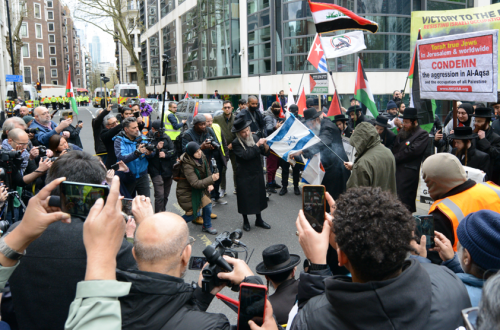Harriet Sherwood in The Guardian reports:
In an unusual move for a newspaper, the Jerusalem Post has published a full-length editorial apologising for a previous editorial which attracted widespread criticism for its comments on last month’s Oslo massacre.
Titled Apology to Norway, Friday’s editorial in Israel‘s leading English-language daily said the original leader column “squarely condemned the attack” in which 77 people were killed by an extreme rightwing gunman acting alone.
She continues [quoting the apology]:
“However, it also, inappropriately, raised issues that were not directly pertinent, such as the dangers of multiculturalism, European immigration policies and even the Oslo peace process.”
Here is the Guardian one week after 9/11:
I think it is safe to say that apart from three or four Palestinians, everyone is sad to see so many of their fellow humans killed in such horrendous circumstances. That goes for most Muslims and the great majority of those who might have been quite pleased to see the US get a different kind of comeuppance. For this second group, in which I include myself, the unqualified sympathy extended to the victims is underpinned by a feeling that few have dared even to whisper. My next-door neighbour said it, and so did a rogue Palestinian whose views have not yet been censored in the name of “taste”. They are better placed than I am, as a broadsheet commentator, to admit to a part of them that thinks that the US might benefit from an insight into what it feels like to be knocked to your knees by a faceless power deaf to everything but the logic of its own crazed agenda.
And:
When America speaks from its heart, it retreats into a language that none but its true-born citizens can begin to understand. At the root of this is an overwhelming need to control meaning. America can’t let the world speak for itself. It was taken unawares last Tuesday and part of the trauma of that event was the shock of being forced to listen to a message that it hadn’t had time to translate.
Can you can think of other examples, where the Guardian responds to mass murder “inappropriately”?
Back to Sherwood’s Guardian piece, we then read:
Steve Linde, the Post’s editor-in-chief, swiftly posted an addendum to the online version, clarifying the editorial: “This editorial is not aimed at deflecting attention from the horrific massacre perpetuated in Norway, nor the need to take greater precautions against extremists from all sides.”
That brings to mind a piece published online by the Guardian, one week after four Pakistani terrorists murdered an Orthodox Jewish couple in a Chabad house, which tried desperately to make a political point about Israel. Look how Richard Silverstein morphs the atrocity into a point about Israel:
Therefore, the attack was anti-Israeli, though not necessarily antisemitic. […] What should really be understood is that, as with the Israeli-Palestinian conflict, here we have essentially a political/territorial conflict between Pakistan and India over Kashmir that has been turned by Hindu and Muslim extremists on both sides into a religious crusade. […] The same is true of Israel-Palestine. Israel’s nationalist leaders would like nothing more than to piggyback their own cause onto the western jihad against radical Islam.
There are countless more examples, of the Guardian doing precisely what the Jerusalem Post has apologised for doing, but this doesn’t appear to bother Sherwood.
Why should it?
Sherwood observes, of this apology:
However it failed to stem an avalanche – the Post’s own word – of letters and comments criticising the editorial and some comment pieces. “Your editorial … shockingly and shamelessly attempts to offer justification for [an] extremist violent act of terror,” said one.
According to the Guardian, the Jerusalem Post failed to stem an avalanche of criticism, regarding its coverage of Norway. Similarly, the Guardian has failed to stem an avalanche of criticism regarding its coverage of Israel. Pieces flagging the Guardian’s appalling treatment of Israel regularly appear in the Jewish Chronicle, Harry’s Place and Just Journalism. There is even an independent website set-up to monitor the way the Guardian deals with Israel – CIF Watch.
If the JPost “failed to stem an avalanche”, then so has Guardian, surely.
Further, Sherwood writes:
Anders Behring Breivik, the perpetrator of the Oslo attacks, posted a manifesto on the internet expressing extreme anti-Muslim views and support for far-right nationalism and Zionism. He cited at least one Jerusalem Post columnist as an influence on his thinking.
Yes, but:
1. Breivik’s writings discuss a “Jewish problem”, he wishes the Nazis had deported all Jews to Palestine. He does express support for Zionism (in so far as he sees it as a battle against Muslims), but he also expresses his admiration for jihadist groups (in so far as he sees them engaged in holy Middle Eastern battles, just as he sees Knights Templar warriors engaged in holy European battles).
2. Breivik “cited at least one Jerusalem Post columnist”. If this one reference is enough to damn the Jerusalem Post, then can the Guardian explain why Breivik made reference to the Guardian 63 times, and the Jerusalem Post only 7 times?
Sherwood concludes:
Friday’s editorial concluded with the “hope that the Norwegian government and people will accept the Post’s apology and forgive us for any offence or hurt caused by our editorial and columnists at this sensitive time”.
It was not known if the original editorial’s author had been reprimanded. There was no one available at the Post’s offices to comment.
Ahem.


